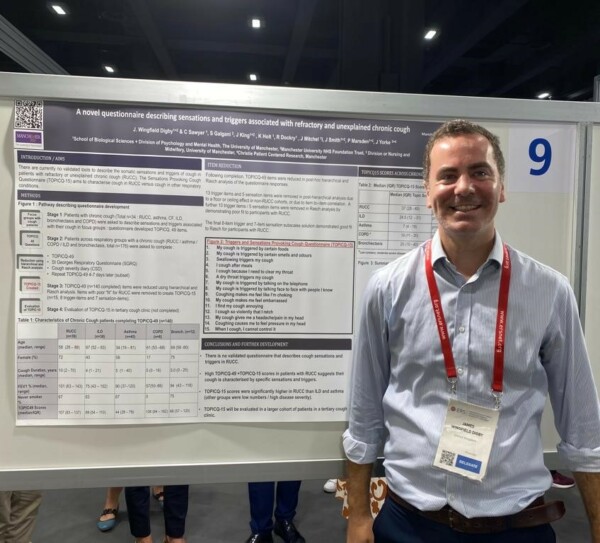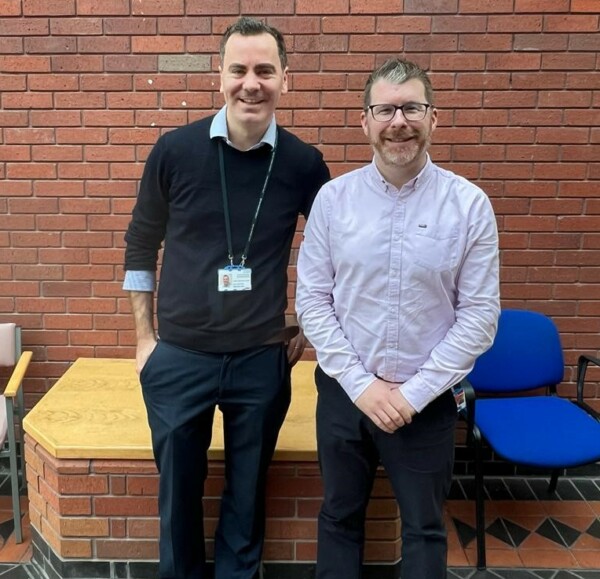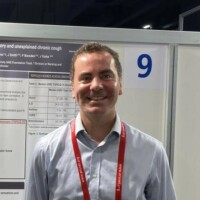The NIHR Associate Principal Investigator training scheme – a blog by Dr James Wingfield Digby
In this blog, Clinical Research Fellow and PhD student Dr James Wingfield Digby shares his insights from the NIHR Associate Principal Investigator training scheme, which gave him practical experience of delivering clinical research.
My research
I’m a Clinical Research Fellow at Manchester University NHS Foundation Trust (MFT) studying for a PhD on the biology of chronic cough at the National Institute for Health and Care Research (NIHR) Manchester Biomedical Research Centre (BRC). I work in Professor Jacky Smith’s research team within the BRC’s Respiratory Theme. Our research aims to improve our understanding of chronic cough. We have a particular focus on the biology underpinning cough in health and disease. We hope that in the future this will lead to better and earlier diagnosis of this exceedingly troublesome condition, alongside improved treatment options.

The NIHR Associate Principal Investigator training scheme
Alongside my PhD, I have taken part in the NIHR Associate Principal Investigator scheme. This scheme is an opportunity for hands-on experience of delivering a study and is designed for people who do not normally take part in clinical research in their day-to-day roles or have recently transitioned into a research role (such as a PhD or early career research fellow).
Working with a principal investigator (PI) over 6 months, individuals learn about study set-up, management, and training. They have access to an online platform, with links to NIHR training videos and Good Clinical Practice courses, which provide a framework for good research practice.
Why I did the course
This course provided a formal framework to assess and evidence my knowledge of clinical trial delivery. The course structure and online platform allowed for flexible learning. The scheme also tied in neatly with transitioning from an NHS role to delivering research during a PhD.
My experiences of the scheme
During the scheme I have acted as an associate PI on an observational study called StARR, which is looking at symptoms experienced in patients with chronic cough. With PI Dr Paul Marsden, Consultant in Respiratory Medicine who leads the Manchester Chronic Cough Service at MFT, we are evaluating a novel questionnaire assessing triggers and sensations which provoke cough to find out how these relate to other measures of chronic cough severity and impact. We also aim to see how these sensations and triggers change over the course of assessment and treatment. This is a real-world study of patients referred to NHS cough clinics at Wythenshawe Hospital, part of Manchester University NHS Foundation Trust, and Royal Preston Hospital, part of Lancashire Teaching Hospitals NHS Foundation Trust.
The NIHR Learning Platform is user friendly and provides clear instructions outlining the Associate PI scheme journey and learning outcomes. A monthly learning blog is provided with suggestions on study-related activities. Additional online lectures are available on a range of subject areas related to research governance, ethics, and study delivery.

My supervisor, Paul Marsden, and I incorporated the scheme checklist and materials into weekly and fortnightly PhD supervisor meetings. For NHS colleagues, meeting with the study PI can be flexible and arranged around clinical commitments over the course of 6 months. The platform allows PIs to signpost the Associate PI to specific training on the online platform, for example there is section on managing and documenting adverse reactions during a study.
Not only have I enjoyed participating in the scheme, but it has also given me a greater understanding of the role of the PI, research frameworks and study delivery.
Professionally, the scheme has provided opportunities for training, collaboration, and personal development. This leaves me well equipped to further my research career within Manchester BRC.
